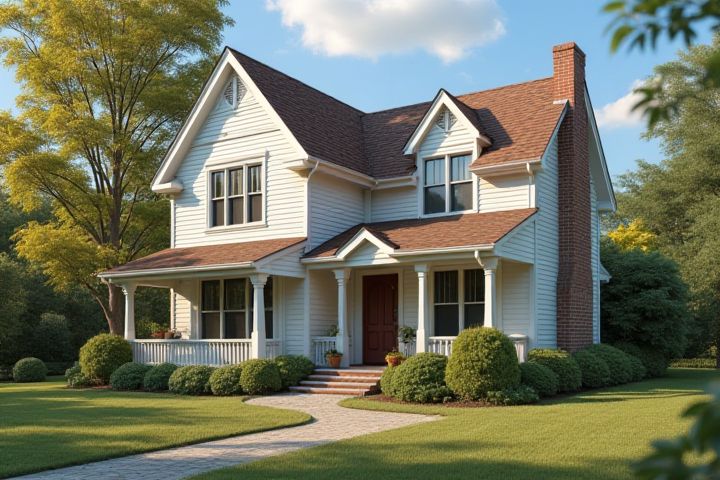
A house flipping business involves purchasing properties, typically distressed or undervalued, renovating them, and then selling them at a profit. Investors analyze market trends, property values, and neighborhood dynamics to identify the best opportunities. Key components of a successful flip include effective budgeting for renovations, understanding local regulations, and conducting thorough inspections before acquisition. You can benefit from leveraging a network of contractors and real estate agents to streamline the renovation and selling processes. This strategy requires knowledge of financing options, such as hard money loans, to fund both purchases and upgrades.
What Is A House Flipping Business
Buy undervalued properties
A house flipping business centers around acquiring undervalued properties, typically those needing renovation or repair. Investors identify properties in desirable neighborhoods, analyze market trends, and evaluate potential for appreciation. After purchasing, they renovate the homes to enhance value, utilizing strategies like interior updates, exterior improvements, or energy-efficient installations. Once the property is upgraded, the investor lists it for sale at a profit, capitalizing on the increased market value.
Renovate for added value
A house flipping business that focuses on renovation for added value typically involves purchasing properties in need of improvement, investing in strategic upgrades, and reselling them at a profit. Key renovations often include kitchen remodels, bathroom upgrades, and enhancing curb appeal, which can significantly boost property value; for example, a renovated kitchen can increase a home's value by 10-15%. According to recent market analyses, investors might earn an average return on investment (ROI) of 20-40% when flipping houses in high-demand areas. To succeed, you should conduct thorough market research to identify properties with the highest potential for appreciation after renovations.
Time-sensitive for profits
A house flipping business focuses on purchasing properties at a lower price, renovating them, and quickly selling them for profit. Time-sensitive strategies are crucial, as the speed of the renovation and sale can significantly impact your overall profitability. By monitoring market trends and identifying desirable neighborhoods, you can maximize your return on investment before property values fluctuate. Engaging reliable contractors and efficiently managing timelines can streamline the flipping process, allowing you to capitalize on emerging opportunities swiftly.
Market research is crucial
In a house flipping business, effective market research can significantly determine your profitability and success. By analyzing local housing trends, such as average sale prices and days on the market, you can identify lucrative neighborhoods that are ripe for investment. Utilizing tools like Zillow or Redfin, you can gather data on comparable properties to assess potential renovation costs and resale values. Understanding these market dynamics will empower you to make informed decisions, ensuring your flips appeal to buyers and maximize your return on investment.
Budget management is key
A house flipping business primarily revolves around buying properties at a lower price, renovating them, and selling them for a profit, often targeting a return on investment (ROI) of 20% or more. Efficient budget management is critical in this process, as keeping renovation costs under control--typically ranging from $15,000 to $50,000 per project--can significantly influence overall profitability. You must account for unforeseen expenses, which can exceed 10% of your renovation budget, ensuring you have a financial buffer. Strategic budgeting also involves accurately estimating timelines and costs to minimize holding costs, which can accumulate daily as the project extends beyond the planned schedule.
Understand local real estate laws
A house flipping business requires a thorough understanding of local real estate laws to navigate zoning regulations, property taxes, and renovation permits effectively. Knowledge of real estate transactions, including disclosure requirements and titles, is essential to ensure compliance and avoid legal pitfalls. Familiarity with the housing market dynamics in your area allows you to identify profitable investment opportunities and assess property values accurately. By staying informed about local laws, you can protect your investment and streamline the buying and selling processes, maximizing your profits in this competitive market.
Networking with contractors
A house flipping business thrives on strong networking with contractors, as securing reliable and skilled professionals is essential for successful renovations. By building relationships with electricians, plumbers, and general contractors, you ensure quality workmanship and timely project completion. Effective communication with your network allows for budget management and insights into the latest materials and techniques, ultimately increasing your profit margins. Your ability to quickly adapt to market trends hinges on this network, enabling you to flip homes efficiently and capitalize on lucrative real estate opportunities.
Financial risk involved
House flipping involves purchasing a property, renovating it, and selling it quickly for a profit, but it carries significant financial risks. You might encounter unexpected renovation costs that can erode your budget, impacting your potential return on investment. Market fluctuations can also affect property values, leading to losses if the market turns unfavorable during your holding period. Proper financial planning, including a contingency fund and a thorough understanding of local real estate trends, is essential for mitigating these risks and ensuring a profitable house flipping venture.
Requires negotiation skills
A house flipping business primarily focuses on purchasing undervalued properties, renovating them, and selling them for a profit, necessitating effective negotiation skills. Successful flippers often acquire homes at 10-30% below market value, leveraging negotiation tactics to maximize their gains. Your ability to negotiate repairs and costs with contractors can significantly impact overall expenses and profit margins, ensuring a successful investment. In 2023, the average profit margin for flipped homes was around $66,000, underscoring the necessity of honing your negotiation expertise to secure the best deals.
Resell quickly for profit
A house flipping business centers on purchasing undervalued properties, renovating them, and reselling them rapidly for a profit. This process involves identifying market trends, calculating renovation costs, and understanding buyer preferences to maximize return on investment. By focusing on cosmetic improvements, such as modernizing kitchens and bathrooms, you can significantly enhance property appeal without excessive expenditures. The goal is to minimize the holding time and leverage effective marketing strategies to attract potential buyers promptly.
